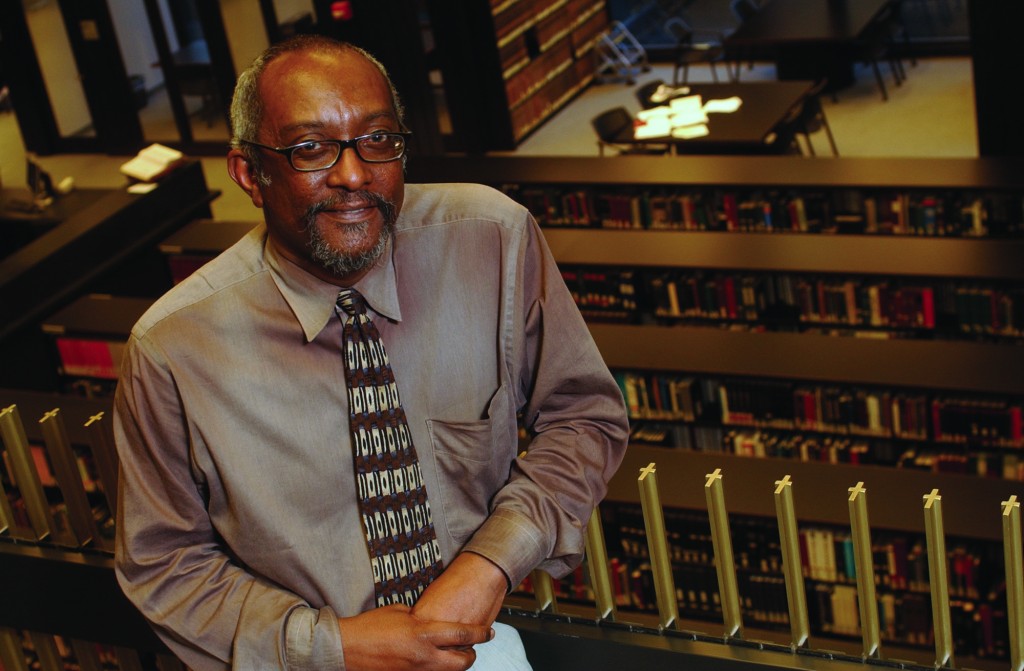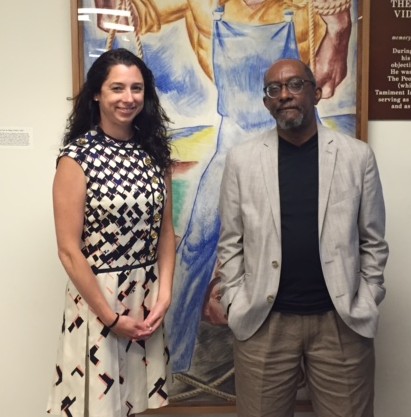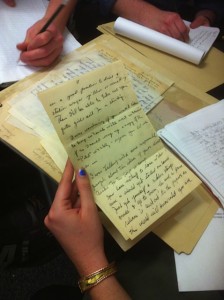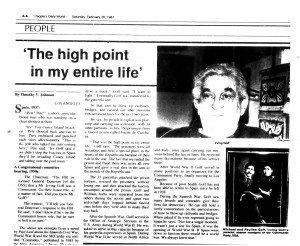Tamiment’s New Leadership: The Next Chapter
Timothy Johnson takes over this month as Head of Tamiment Library, whose outstanding holdings include the ever-expanding ALBA collection. Johnson will be working with Assistant Curator and Public Services Librarian Kate Donovan. A conversation about plans, challenges, and legacies.
Longtime NYU librarian and archivist Timothy Johnson takes over this month as Head of Tamiment Library and Robert F. Wagner Labor Archives, one of the country’s richest archival troves of labor and civil rights activism—and, for the past 15 years, home to the ever-expanding ALBA collection. Johnson, who joined NYU in 2005 as a subject librarian in Africana Studies, is a specialist in African-American history and long-time political activist. In 2007, he helped arrange for the transfer of the archives of the Communist Party of the United States, which are now also at Tamiment. Johnson succeeds Timothy Naftali, and the late Michael Nash and Deborah Bernhardt.
The history of the ALBA collection is closely connected with the Veterans of the Abraham Lincoln Brigade and ALBA’s mission as an educational non-profit. The collection—which includes letters, books, posters, manuscripts, photographs, film, audio, and various other artifacts related to the lives and work of the volunteers of the Lincoln Brigade—was initially held at Brandeis University in Boston. In 2000, ALBA was instrumental in moving it to New York University. This was a major undertaking. “The collection had outgrown Brandeis’s meager resources,” recalls ALBA chairman emeritus Peter N. Carroll, “and NYU was willing to devote the energy to fully organize and index a great multitude of archival material.”
This summer, I spoke with Tim Johnson and NYU’s Kate Donovan, who since 2013 has served as Assistant Curator and Public Services and Instruction Librarian.
Why is NYU, and Tamiment in particular, a good place for an archive like the ALBA collection?
Johnson: Tamiment has a world-wide identification with labor, peace, progressive, and left-wing movements. Since the history of the Lincoln Brigade cuts through all of those movements, Tamiment is a logical place for this archive. We have on our faculty at NYU several scholars who study the Lincoln Brigade and/or the Spanish Civil War. And since ALBA is also in New York, there’s a substantial local base of support for, and use of, the collections.
The ALBA collection was about 300 linear feet when it arrived from Brandeis. More than 200 linear feet have been added since then.
Donovan: The collections have grown substantially since they first arrived at Tamiment. There are approximately 300 separate collections that make up the “ALBA Collection.” According to the records we have, the collection was about 300 linear feet when it arrived from Brandeis. More than 200 linear feet have been added since then. A rough estimate suggests that there are approximately 514 linear feet of materials, along with posters. Our usage statistics, which we started recording in 2008, show that the ALBA collections have been requested approximately 2,600 times. They’re regularly used for classroom instruction and student projects as well.
What have the milestones been for the collection since it arrived at NYU?
Donovan: In addition to the collection’s growth and usage, there are a few other things that are worth highlighting. In 2006, for example, Tamiment completed an NEH grant that resulted in the preservation, arrangement, description, and cataloging of approximately 320 linear feet of collection materials, including oral histories, photographs, film, and posters. Another milestone was the large-scale digitization of a number of the photograph collections, including the Harry Randall Fifteenth International Brigade Films and Photographs and selected images from the International Brigades Archive in Moscow. We also did a large-scale digitization of many of the posters in the collection.
What are the main challenges for Tamiment in the years ahead?
Johnson: I think the main challenge is the one that faces most archives: How do we bring our collections out of the archive so they are more accessible to the public? The central avenue through which this can be accomplished is by the digitization of the collection and making it accessible through the web. Unfortunately, digitization is very costly, which is one barrier. But we also need to begin developing our web presence. So we need to expand our fundraising abilities and develop the technical and graphic expertise needed to accomplish these tasks.
Tim, how do you see this position at Tamiment in light of your trajectory thus far?
Johnson: Well, labor and the left have been at the center of my scholarly, journalistic, and political activity for nearly 50 years. So in that sense, it seems a natural fit and a logical culmination to my 40-year professional career as a librarian.
“Labor and the left have been at the center of my scholarly, journalistic, and political activity for nearly 50 years.”
I’ve been at NYU Libraries for nearly 10 years as a subject librarian in Africana Studies. When I would tell people who know me that I work at NYU Libraries, their automatic response was, “Oh, so you work at Tamiment.” Of course that necessitated an explanation that Tamiment is a separate archive within NYU Libraries, and so on. Now, I can just say, “Yeah.”
What excites you most about this position?
Johnson: The most exciting aspect is the opportunity to work with such a dedicated core staff at Tamiment and NYU Libraries. Kate is a wonderful teacher, who has developed a keen sense of the collections in just a few years. It takes a rare ability to make a collection come alive to a group of students brought in by their professor. We recently had a visit from a family who has supported the ALBA collection. They were in from California and asked for a short tour of Tamiment. On very short notice Kate pulled together a small exhibit, which the visitors later described as a “fascinating, moving review of well-chosen Tamiment/ALBA materials.” This ability reflects a certain sensitivity and understanding of the collection.
Is there anything that has you worried?
My biggest “worry” is the challenge to live up to the standards set by Mike Nash. Mike was a good friend and mentor to me who, shortly after my arrival at NYU, brought me into the work of Tamiment. His foresight on how to build on existing collections, while expanding the purview of the collections, will be difficult to match.
Do you have any personal history with the veterans of the Lincoln Brigade?
Johnson: As I said, I’ve been politically active on the left for all of my adult life and very early on had read things referencing the Spanish Civil War, but had not done any significant reading.
In the early 1980s, in Chicago, I joined the Communist Party and I noticed that “Lincoln vets” were treated with a certain deference and sometimes even reverence. That intrigued me. I move to Los Angeles in the mid ‘80s and at my first L.A. Party club meeting there was a discussion of Gorbachev’s notion that some ideas, such as peace, were not based on class interests, but were rather human interests. This was quite controversial as it went against most understandings of Marxist philosophy and historical materialism. The discussion in the club was at a rather low theoretical level, but near the end an older guy, dressed in sneakers and a leisure suit—old folk’s wear in Southern Cal at the time—spoke. I don’t remember what he said but I was impressed with his level of philosophical understanding. After the discussion I introduced myself and he said his name was Irv Goff—which meant nothing to me at the time.
“At my first L.A. Party club meeting in the early 80s I was impressed by an older guy, dressed in sneakers and a leisure suit. After the discussion I introduced myself and he said his name was Irv Goff.”
One week later I picked up a cheap paperback novel entitled “Comrades,” by Paul Leaf. It was centered on fictional characters who fought in the ALB and later became famous in Hollywood. In the first chapter they introduced a character named “Irv Goff” and went into detail about his background. This character had a major presence throughout the novel. I remembered thinking, “This can’t be a coincidence.” I asked around and discovered that the Irv I met was a Lincoln vet. The next time I saw him we discussed his experiences. About a year later I was working as the Southern California correspondent for the People’s Daily World and wrote a one-page feature story on Irv. I spent several hours in his apartment and he went into great detail about his life and experiences. I found Irv’s story so interesting that I began doing further reading on the ALB and the Spanish Civil war. Later in New York, I met Len Levenson, who was a real nice guy. He was the editor of Political Affairs, for which I wrote fairly frequently.
How do you see the partnership between Tamiment and ALBA as an educational 501(c)3?
Johnson: We look forward to discussing ways we can strengthen our partnership. We have similar/compatible missions and should be working more closely—perhaps by co-sponsoring book talks and discussions. We would also like to have a display table of some of our materials at your annual event. Given the logistics of security it would mostly be digital surrogates, but even those would help get the word out.
“Our main challenge is the one that faces most archives: How do we bring our collections out of the archive so they are more accessible to the public?”
In fact, I would encourage all to come in to view our collection. You can locate finding aids on our website. If anyone has material to donate, please don’t hesitate to contact us. If there are things you want to keep during your lifetime, we can help compose a legal document so that the material will come to Tamiment upon your passing. We have first-rate preservation facilities and the material you donate – papers, letters, artifacts, etc. – will be kept safe and secure so that future generations will understand the importance of the ALB in the fight against fascism.
Tamiment Library is at 70 Washington Square South. An overview of the ALBA Collection, including finding aids and digitized collections, is online at http://www.nyu.edu/library/bobst/research/tam/collections.html#alba.
Sebastiaan Faber teaches at Oberlin College.

















[…] Full text at The Volunteer. […]